Contractor Comment: Infuriating weather sees new kit sit idle
Third in this year’s Contractor Comment hotseat is James Townley, who runs JD Townley & Son with his father Roy.
See also: Contractor Comment: Interest rates a threat for Cropmech
About the contractor
 James Townley is a third-generation contractor at JD Townley & Son, which offers the full suite of agricultural services across County Down.
James Townley is a third-generation contractor at JD Townley & Son, which offers the full suite of agricultural services across County Down.
Q How did you get into contracting?
I’m the third generation in the contracting business. It was started by my grandfather 70-odd years ago when he borrowed a pair of horses from a family member to do some ploughing for a neighbour.
At least 90% of our work is now mainstream agricultural contracting. The rest of the time is spent on our own 30ha and another 100ha rented for arable crops. The farm alone was never big enough to sustain the family.
We’ve always offered a broad range of services, so the workload hasn’t really changed over the past couple of decades. The big difference is that we’re now working for fewer customers.
They’ve grown as others have dropped out – the farmers have retired, and their sons have swapped agriculture for building trades.
Q Main contracting enterprises today?
We try to offer everything. That’s always been the case – my grandfather was determined to keep the money coming in year-round.
We’re slurry spreading from 1 February, then move into spring drilling, maize drilling, fertiliser spreading, forage harvesting, combining, autumn crop establishment and maize harvesting, plus a bit of land drainage between times.
In our view, this is the best way to go. There will be fewer farmers and contractors in the future, and we think those that specialise in one or two services will be first to fall.
For one thing, it’s getting harder to find seasonal staff. And with machinery costs rising, you need to have plenty of work to justify the kit – particularly the tractors.
The introduction of the closed slurry spreading window from October to February has made life harder in that regard. It has condensed the workload, and wet years like this only make things worse.
We have scaled back on some fronts, though not necessarily by choice. Hedgecutting has dwindled, as most farms have bought their own machine, and the same goes for round baling.
The combi baler-wrapper market is saturated in this area – there are probably 10 McHale Fusions in a 10-mile radius – so we now concentrate on pit silage.
It’s no bad thing. Dad detests it because there’s a massive up-front expense in buying the net and wrap, which we then wait at least a month to be paid for.
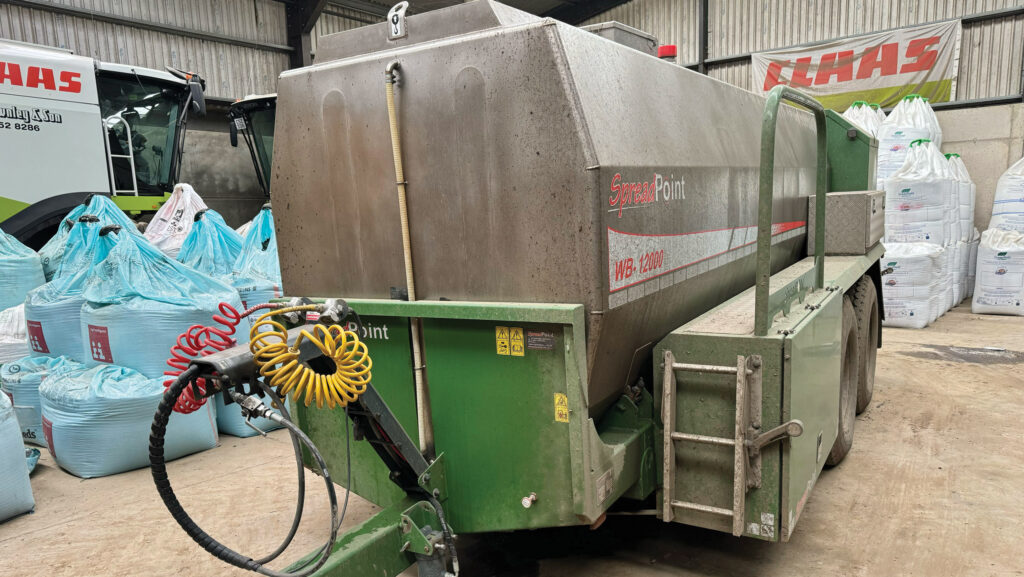
© MAG/Oliver Mark
Q Any forms of diversification?
No, but we’d like some. We’re always looking at means of filling winter voids.
During the months that we can’t spread slurry I joke that we’re more a not-for-profit charity than a business, as we do very little work that generates income.
That said, it allows us to renovate the yard – we’re just finishing putting up a new machinery shed – and keep on top of maintenance.
Each of the combines gets a week’s attention – a day blowing off, two or three days of power washing, and another day to pump it with grease and refit the guards.
Taking time on this gives us a chance to have a good look at every belt and sensor, so we can spot and fix any defects. We want everything ready to go when the season starts; reliability is essential.
It’s a relatively expensive task at a time of year when there’s little money flowing in, but that’s where proper costings come into their own.
We know that servicing tractors costs us £2/hour, that keeping combine headers in good condition is £7-12/ha, and that serviceable items for the Lexions, such as filters, add another £5/ha. We factor all these into our rates.
Aside from maintenance, I’ve thought about using the quiet period to make straw briquettes for domestic log burners.
The one thing that’s holding me back is the cost – the machine itself will be upwards of £30,000, plus another £10,000 for ancillary items.
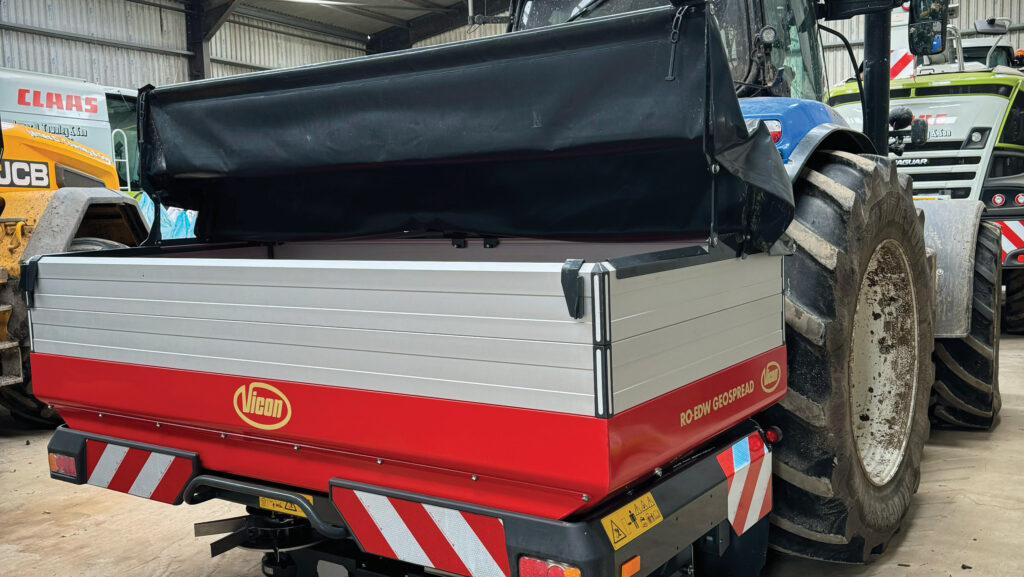
© MAG/Oliver Mark
Q Most profitable contracting enterprise?
There’s not one service that’s more profitable than the rest. Everything is priced according to our costs.
I spend the winter putting numbers in spreadsheets – diesel use, spare parts and service items, labour, depreciation. That way, I can calculate future rates as accurately as possible.
But you have to marry that with experience. Fuel consumption, for instance, can vary wildly depending on the conditions, no matter whether it’s power harrowing, mowing or silage carting.
Last year, the combines used 6 litres/ha more diesel than average, as the fields were too wet for the tractors and trailers, meaning we had to unload at the gateway.
Unfortunately, the price of it, as well as parts, insurance and depreciation, had gone up and, at the same time, yields were down.
We passed some of those extra costs on to customers, but there was no way we could bump the bill up by £12-17/ha – we just had to swallow some of it.
Farming is a job of extremes. It seems to either go really well or really badly.
Q Least profitable contracting enterprise?
Again, we don’t really have any. However, some require bigger outlays – ploughing being a classic example.
The further below the soil surface you work, the more it costs. Ploughing eats tyres, wears metal and drinks diesel, so you’ll never make a fortune.
Conversely, we might only burn five gallons of diesel per day spreading fertiliser, but it is priced to reflect that.
Q Biggest threats to your business?
There’s no single biggest threat – we’re just gradually being squeezed from all angles.
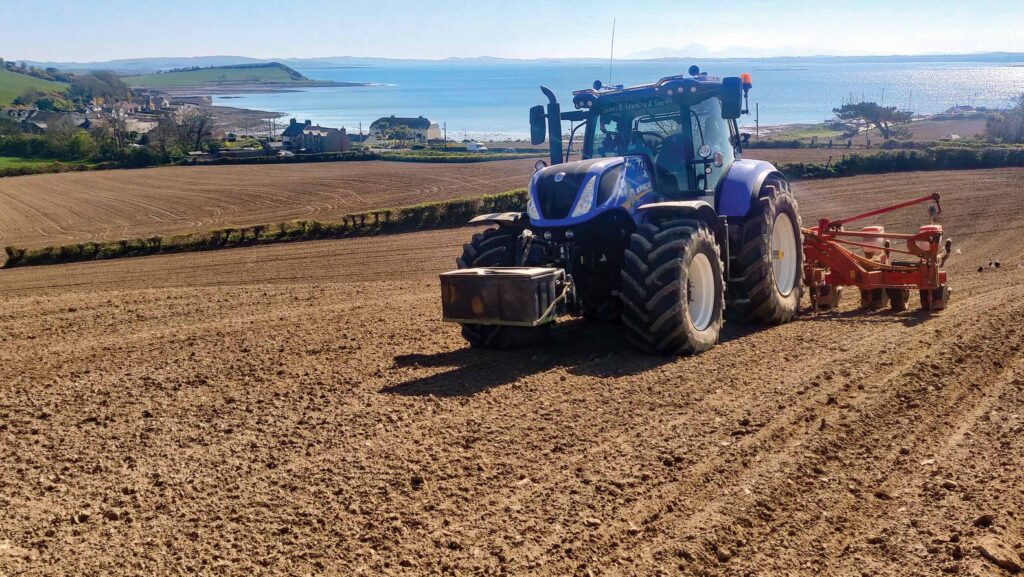
© James Townley
Government policy is perhaps the biggest concern. Politicians in Whitehall are dictating what we can and can’t do, but nationwide policies simply don’t work.
The UK is a diverse place, and rules should be put in place for specific areas.
The obsession with hedgerows is one example – they may well be needed in East Anglia and Lincolnshire, but here we’re surrounded by sub-1ha hedge-lined fields.
The other big threat is the cost of inputs and machinery. Diesel price seems to change three times a day, and equipment just doesn’t stop going up.
For years I’ve been waiting for it to crash like the building trade in 2008, but I’ve about given up on that.
Manufacturers seem to be able to maintain high prices even when demand drops, usually by throwing in warranty and spec incentives to keep order books full.
Just when you think you can afford to buy a decent tractor, it goes up another 10%. That’s a big sum given the starting point is £100k-plus.
And depreciation is a major challenge for us, particularly on the combines. We don’t have the same economies of scale as farmers in south-east England, on which the prices seem to be based.
A Lexion 750, for instance, might do 1,000ha/year there, yet we can only get 400ha out of ours. As a result, our depreciation is double.
Telematics don’t make things easier. Manufacturers know exactly how much work we’re doing with the machines, so they know exactly where to pitch their prices. Usually, they’re just about affordable enough to keep farmers afloat.
Put simply, there’s money to be made from farming, just not by those on the frontline.
Q Difficulties with staff recruitment?
Having a near year-round workload means we can keep five staff, plus my dad and I, full-time.
Finding seasonal workers is becoming harder because there are far fewer farmers that we used to be able to call on to make up the numbers during the summer.
That’s only going to get worse. Farming is a funny business, and youngsters don’t want to get their hands dirty – you have to be born into it to really enjoy it.
Q What excites you about the season ahead?
Nothing right now. Everyone was glad to see the back of 2023, but things were never going to change overnight and I think there will be a big hangover through this year.
Farms may well end up short of silage and straw for next winter, so I see things getting worse before they’re better.
So… I’m looking forward to 2024 being over. That said, attitudes will inevitably change with a good spell of weather, and we all get motivated by the pressure of work – provided it doesn’t become too much.
If anything, I’m most excited for my young lad. He’ll love seeing the machinery running once we’re into the swing of things.
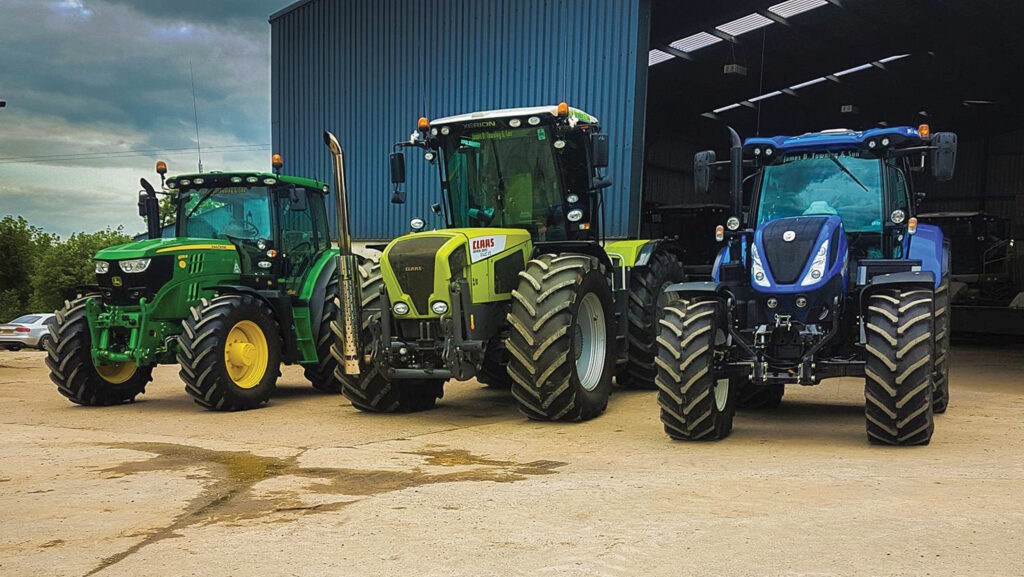
© MAG/Oliver Mark
Q New machines in 2024?
The short spreading window, combined with months of rain, meant we were expecting a massive slurry workload from February onwards.
To prepare for that, we replaced our three 3,000gal SlurryKat tankers with 4,000gal versions that cost £45,000 apiece.
The obvious move would have been to add a fourth model to the fleet, but we’d have ended up queuing at the store and customers never like to see machinery sitting idle.
Another £25,000 went on a second 12m SlurryKat dribble bar to help cover the ground quicker.
Annoyingly, the bad weather meant we didn’t have the work for it through February, March and the first half of April, but hopefully it’ll come into its own after first cut, when there will be plenty of slurry to get out of stores.
We’ve also changed a couple of tractors. Latterly, we’ve been running them longer – up from 5,000 hours to 8,000 or 9,000 – but astronomical prices have also meant a rethink on spec. What you want isn’t always what you need.
That meant downgrading the 6210R to a 6195M. We no longer require it to pull the big square baler, so that tractor will mainly be running a Doda pump. We don’t need anything flashy – the M series will do just fine.
And we swapped the 6195R for a 6175R. There’s not much difference in performance and we saved ourselves a few thousand pounds in the process.
The other big investment was £60,000 on a maize drill. We’ve still got the six-row Samco and eight-row Gaspardo, but the latter is a 2008 model and nearing the end of its life.
Its replacement is supposed to be quicker and more accurate, which is the bare minimum given it was triple the price of the old one. Our rate has only gone up 10% in that time.
On paper, the purchase wasn’t worth it, but sometimes you just have to be creative with the spreadsheet numbers.
We can’t afford to lose the drilling work – in part because of the harvesting that goes with it.
Q Recent major repairs/breakdowns?
Everything happens just outside of warranty – no matter whether we’ve got one year’s worth or five. It’s sod’s law.
Last season, it was the Jaguar 970. First the turbo went, which we replaced. It was back for just a day before the engine self-destructed.
The bill ran to tens of thousands, but it was the worry of being without a machine for an unknown length of time that really had us panicking, particularly as it was such a bad year weather-wise.
Fortunately, Claas was great and provided a replacement while ours was laid up.
That’s where it pays to look after your dealers – we always buy genuine oils and filters from them, which helps keep them on side. Relationships work both ways.
Big breakdowns are one of those things you can’t prepare for. But, if you’re having to regularly cost them in, you’ve got the wrong machine.
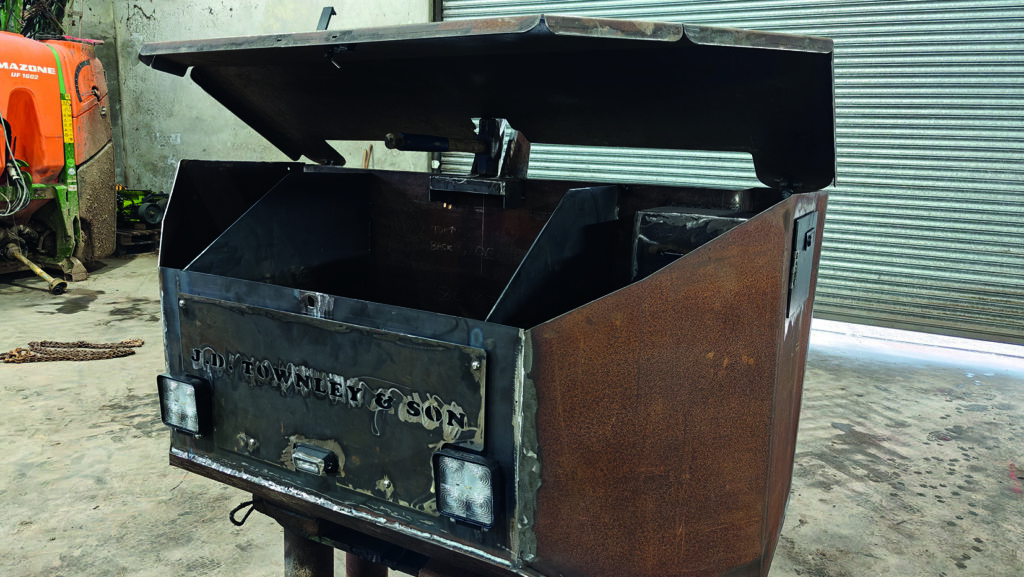
© James Townley
Q Overwinter projects?
Building a front box for the tractor, mainly for maize drilling. Hearing how poisonous maize seed dressing is had me petrified, and I certainly don’t want my gloves and face mask in the cab with me.
We looked at the options at Lamma, but they were all too big and heavy. Ours is only 300kg and has space to carry all the seed, plus a sealed compartment for PPE.
I’d like to do a bit more fabrication – the challenge is finding something that no one else is doing.
We usually come up with the idea and someone else builds it, as we don’t have the time, nor the workshop tools, to do it ourselves.
We can cut and weld metal, but a two-months-a-year hobby doesn’t warrant a big investment in anything fancier.
Q Current contractor frustrations?
The weather. Our turnover was down last year, and the bad spring has hurt cashflow further.
Yet we’re probably in a better position than others, in that we at least know our costs.
Some people buy kit and think they’re making money, but never actually bother doing the sums.
And that’s my other frustration. I’ve nothing against people starting up their own businesses and doing it right, but they often charge impossibly low rates, pinch a few customers then go bust. Inevitably, another one then pops up in their place.
Business facts
JD Townley & Son, Ballygowan, County Down
Main services: Grass (800-1,200ha first cut) and maize (400ha) silage, cultivation and drilling (200-300ha), combining (800-1,200ha), square baling (10,000-16,000 bales/year), spraying (300ha, five passes on average), slurry spreading
Other: 130ha farming, land drainage
Staff: James and Roy Townley, plus five full-time staff and another two or three during seasonal peaks
Kit list
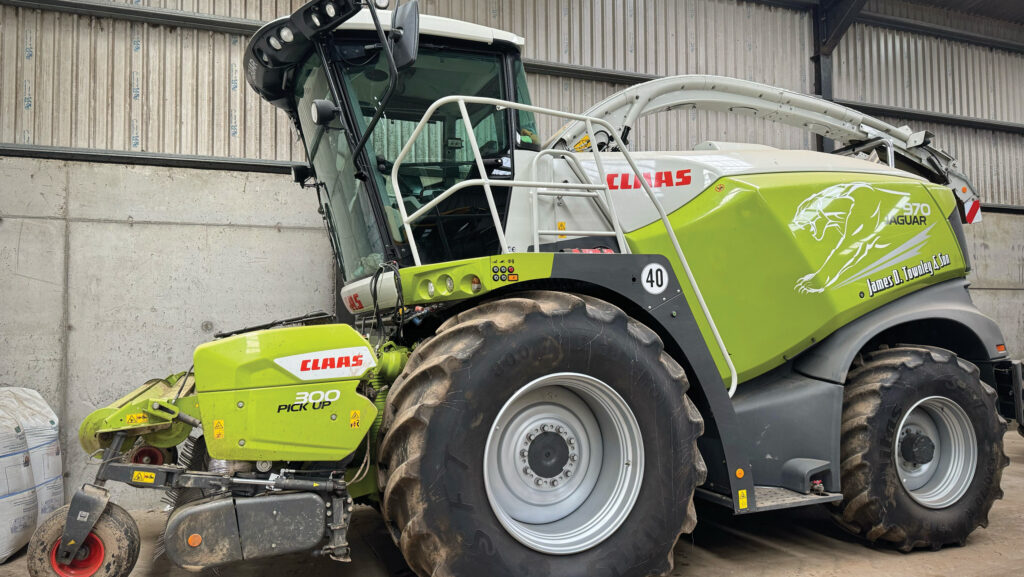
© MAG/Oliver Mark
Tractors John Deere 6145R, 6150R, 6155R, 6175R x2 and 6195M, New Holland T7.245 and T7.270, Claas Arion 520 and Xerion 3300, Massey Ferguson 35X
Combines Claas Lexion 750 TT and 630 Montana, New Holland CX8.80
Forager Claas Jaguar 970
Grass Claas Liner 4000 x2 rakes and Disco 9400C/3200C triple mower
Balers Case IH LB434 square x2, New Holland BR740A and Claas Rollant 734 round
Handlers JCB 435S and 531-70
Cultivation kit Five-furrow KV plough x3, 5m Lemken discs, Kuhn (x2) and Lemken power harrows
Drills 6m Accord, 4m Kuhn and 3m Amazone combi drills, eight-row Gaspardo maize x2, six-row Samco (plastic)
Spraying/spreading Vicon RO-EDW Geospread spreader, Amazone UF02 sprayer (1,600 litres/24m)
Slurry 4,000gal SlurryKat tankers x3, 12m SlurryKat dribble bars x2, Doda pump
Trailers 18t Kane silage x7, 18t Kane grain x2
Other Case CX130 (13t), JCB 3CX, Bruff BT4 trencher

